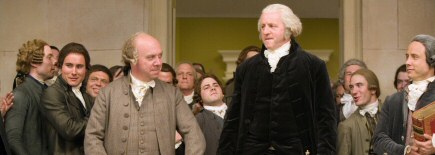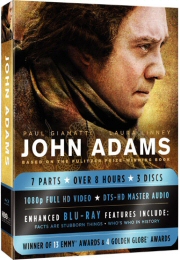 With the temperature dropping, it's time to find someone to keep you warm. Find your hookups with our online dating guide!
With the temperature dropping, it's time to find someone to keep you warm. Find your hookups with our online dating guide!
- Drama
- 2008
- Buy the Blu-ray
All photos © HBO
Reviewed by Will Harris
()
istorical dramas are a notoriously dodgy proposition to pitch to mainstream audiences.
True, Showtime has been doing all right with “The Tudors,” but let’s face it: the success of that series has ultimately been far more to do with audiences eating up the soap opera aspects of the storyline than the historical events which are contained within. HBO’s seven-part miniseries, “John Adams,” couldn’t possibly compete on the same level (nor would its producers have had any interest in attempting to do so), so it’s evident why the network felt obliged to promote the work everywhere possible, up to and including every single Netflix envelope that went out in the weeks preceding its premiere. Those who dared to tune in to a potentially educational program found an enthralling production which will hopefully inspire those who viewed it to sit up and take proper notice of their history. If you were among those who missed out on the experience of “John Adams,” however, you now have the opportunity to rectify that error.
Based on David McCullough’s 2002 biography, “John Adams” provides a detailed examination of the life of America’s second President, with the title character played by…Paul Giamatti? Giamatti might seem on the surface to be an odd choice for the role of John Adams, since he’s known more for the comedic rather than the dramatic and hasn’t done all that many period pieces; the only ones that leap immediately to mind are “The Illusionist” and “Cinderella Man,” and both of those take place in the 20th century, so they’re not really stepping that far back in time. You’d never know of his lack of his experience from his performance here, however. The phrase “acting tour de force” doesn’t begin to describe how substantially Giamatti owns the role of John Adams; it’s a measured performance, showing a man who loves his wife and family but struggles to find a way to keep them close while building a new nation.

The first episode of the series, “Join or Die,” necessarily starts a bit slow, in order to introduce us to Adams and his formidable wife, Abigail (Laura Linney), and establish their relationship. He is a man who is often uncertain of his talents and abilities as a lawyer, confident in his knowledge but, on occasion, prone to offering too much information when making his arguments; she stands behind him at every opportunity, helping him to tweak his oratory without tramping on his masculinity. It’s in Episode 2, however, where Linney gets a chance to build on the character of Abigail Adams, showing how she was required to be at least as strong as her husband to keep their family together while he was serving as a member of the Continental Congress. The scenes involving Abigail and her children as they struggle with the horrors of smallpox are turn-your-head-away excruciating, but they result in showing what a determined woman Abigail was. The relationship between John and Abigail is the thread that runs throughout the events of the entire miniseries, of course, with key moments of their marriage to be found in each chapter, but her declaration of her patience at the end of Episode 5 (“Unite or Die”) is perhaps the most telling of why the pair succeeded so well as a couple.
That second episode, entitled “Independence,” is arguably the definitive episode of the entire miniseries, spotlighting as it does America’s initial steps toward declaring their independence from Britain. We’re introduced to several familiar names, including Benjamin Franklin (Tom Wilkinson), George Washington (David Morse), and Thomas Jefferson (Stephen Dillane), but those who don’t know their history will perhaps be meeting John Dickinson (Zeljko Ivanek, from “Damages”) for the first time. Dickinson, one of the esteemed representatives from the Pennsylvania colony, proves to be a major thorn in the side of Adams and his fellow collaborators in their attempts to secure a unanimous vote for independence. (It would be fair to say that the methodology used to allow Dickinson to save face on the matter has stood the test of time.) Wilkinson’s lighthearted performance as Franklin is wonderful, and Morse paints a picture of Washington as a soft-spoken gentleman with a profound dedication to duty.
As the miniseries progresses, there is more focus on the Adams family as a whole, providing a spotlight for Sarah Polley as daughter Abigail “Nabby” Adams and offering a glimpse of how hard it is for a father to accept his son as a man when he’s been away for most of his childhood. The relationship between John Adams and John Quincy Adams is most at the forefront in the final episode, as father watches son find his way into the Oval Office as well, but so is the often awkward association between John Adams and Thomas Jefferson. Indeed, “Peacefield” (the episode in question) is an emotional voyage throughout, but one cannot help but be uplifted by the thought of what Adams accomplished within his lifetime.
Director Tom Hooper has sought to make “John Adams” work not simply as a drama but also as an authentic historical representation of the era. The cinematography is designed to remind viewers just how dark things were in the days before electricity, but it also works to provide a feeling of foreboding, ominously reminding us that war is right around the corner. (The haunting soundtrack by Robert Lane and Joseph Vitarelli serves the same purpose.) Calling the series a “costume drama” is to sell it short; with “John Adams,” the combination of top-notch performances and period accuracy results in history truly coming alive.
Special Features: The making-of featurette – cleverly titled “The Making of ‘John Adams’” – provides considerable insight into the amount of work and dedication which went into the creation of this series and the accuracy contained within. Though not quite as illuminating, “David McCullough: Painting with Words” does offer an entertaining look into the life and times of the man who wrote the book on which the miniseries was based. There’s also an optional but highly recommended pop-up feature called “Facts Are Stubborn Things” that fleshes out bits and pieces of the historical events unfolding onscreen, as well as the Blu-ray exclusive, "Who's Who in History," a series of mini-biographies for all of the major characters that can be accessed at any point during the course of an episode.
 |
 |
 |
|
 |
 |
You can follow us on Twitter and Facebook for content updates. Also, sign up for our email list for weekly updates and check us out on Google+ as well.











